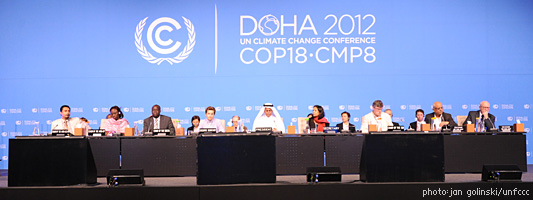
World Faces 4-6 Degree Temp Rise
New research shows that, unless radical action is taken, we are on course for a 4 to 6 degree warming by the end of the century.
 The daunting size of the challenge facing world leaders at the Doha talks has been laid bare by new research that shows that, unless radical action is taken, we are on course for 4 to 6 degree warming by the end of the century.
The daunting size of the challenge facing world leaders at the Doha talks has been laid bare by new research that shows that, unless radical action is taken, we are on course for 4 to 6 degree warming by the end of the century.
According to the latest analysis for the Global Carbon Project by the Tyndall Centre for Climate Change Research at the University of East Anglia, emissions from burning fossil fuels are projected to rise by 2.6 per cent on last year’s levels to a high of 35.6 billion tonnes.
This means that global emissions have jumped 58% between 1990 and now.
One of the lead authors of the study, Professor Corinne Le Quere, said the research was a stark reminder of the challenge to cut emissions to the recognised target level of 2 degrees, which would soon become “unachievable” unless “large and concerted global mitigation efforts are initiated soon”.
“With emissions continuing to grow, it’s as if no one is listening to the entire scientific community”, she said. “I am worried that the risks of dangerous climate change are too high on our current emissions trajectory. With the pathways we are on with intensive fossil fuels we are looking at 4, 5 or even 6C.”
Warning that “the climate is not a toy you play with,” she argued that this kind of rise would mean a “change in vegetation, risking food production and the melting of ice sheets that could cause severe changes in the weather.”
For years the largest emitter of carbon dioxide was the United States, but now China is forging ahead with its emissions growing by about 10 per cent. The country now emits 28 per cent of the total CO2, compared to the US at 16 per cent, and the European Union at 11 per cent.
Per capita climate emissions are also revealing. In oil rich Qatar, where the conference is occurring, the average person consumes 43 tonnes, in the US it is 17 tonnes, the EU, 7.3 tonnes and China 6.6 tonnes.
The news about the rising emissions prompted concern from some politicians. Britain’s climate change secretary, Ed Davey said: “As things stand, the world is plainly not on track to keep the global temperature increase from climate change below two degrees … Anyone who engages seriously with the science is right to be concerned.”
But that concern does not seem to be manifesting itself into a call for greater urgency in Doha.
India’s chief negotiator, Meera Mehrishi at the talks says “After Hurricane Sandy, I thought the point of view of the Western world would change a little bit. I don’t see that happening.”
